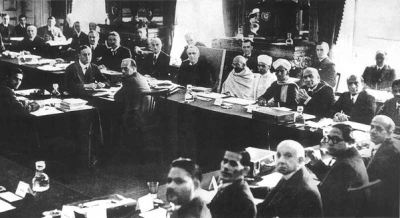
There were three Round Table Conferences from 1930 to 1932. These were a series of peace meetings organised by the British Government and Indian leaders to discuss constitutional reforms in India.
As Indian leaders continued to demand independence, the British called for a Round Table Conference in 1930 to consider the constitution of India. The Simon Commission, derided in India, had recommended measures from the Government of India Act of 1919. The report was published in 1930. Why was the commission headed by Sir John Simon boycotted in India? Because all its members were English and it had no representative from India which was seen by Indians as a deliberate attempt to undermine their self-respect. In response to the inadequacy of the Simon Report the Labour Government which had come to power under James Ramsay MacDonald in 1929, decided to hold a series of Round Table Conferences in London.
The first Round Table Conference was inaugurated by King George V in the Royal Gallery in the House of Lords, in London (November 1930 to January 1931). It had over 70 representatives from all Indian States and all parties except the Congress, as most of its leaders were in jail for their participation in the civil disobedience campaign.
What was the outcome of the first RTC? Nothing significant emerged from it. The members agreed on a parliamentary form of government for India as a dominion under the British king. Civil disobedience intensified. Hence, the British Government realised the importance of involving the Congress in deciding the future of the country.
The second session (September 7 to December 1, 1931) was attended by Mahatma Gandhi as the Congress representative at Viceroy Lord Irwin’s persuasion. Gandhiji rejected communal representation and asked for constitutional reforms for self-rule, which the British did not agree to
Neither the Congress nor the British Labour Party attended the third session (November 17 to December 24, 1932). The Round Table Conferences failed.
Did you know?
B. R. Ambedkar, the father of the Indian Constitution and the leader of the depressed classes, participated in all three Round Table Conferences.
Picture Credit : Google




